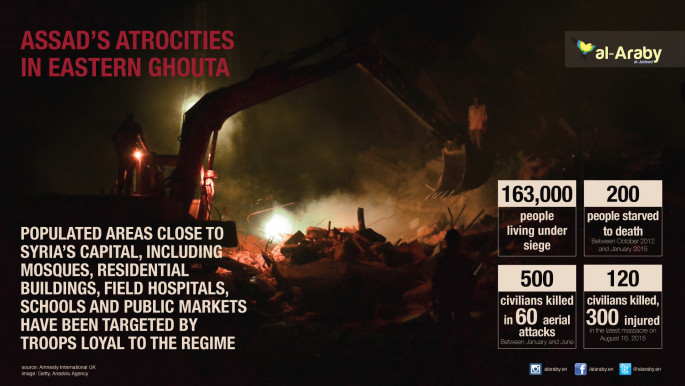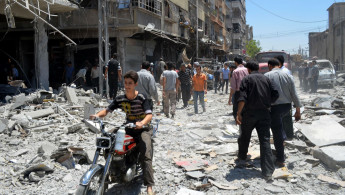Douma attack revives call for Syria arms embargo
The New York-based group said the Sunday attack on Douma showed the government's "appalling disregard for civilians".
The bombing hit a crowded marketplace in the Eastern Ghouta region town, and killed mostly civilians.
 |
|
"This latest carnage is another reminder - if any was still needed - of the urgent need for the Security Council to act on its previous resolutions and take steps to stop indiscriminate attacks," HRW deputy Middle East director Nadim Houry said.
The Syrian Observatory for Human Rights, a UK-based activist group, said on Thursday that 117 people had been killed in the Douma attack. Syrian Foreign Minister Walid Muallem defended the attacks in comments to an Egyptian television station published on Thursday by Syria's official news agency SANA.
"It is natural for the Syrian government to use the appropriate tools to defeat terrorism," he said.
"But many of the terrorists use civilians as human shields, so what is claimed about massacres in Douma or elsewhere is fabricated news."
The incident was among the single deadliest government assaults in the conflict, which began in March 2011.
It came almost two years after a chemical weapons attack on Eastern Ghouta that the US said killed 1,400 people.
Much of the international community blamed Syria's government for that attack, though it denied responsibility.
HRW noted that Douma, as well as other parts of the rebel bastion of Eastern Ghouta, are regularly targeted in regime air raids that disproportionately kill civilians.
The group also criticised rebels operating in the area for firing indiscriminately at civilians in nearby government-held territory, including Damascus.
HRW said the Security Council was failing to enforce its own resolutions calling for an end to attacks on civilians and the indiscriminate use of weapons in crowded places.
It urged the UN to monitor such attacks, attribute responsibility for them and sanction those to blame.
"How many more lives will be lost before the Security Council enforces its own words?" Houry asked.
In June, UN Secretary-General Ban Ki-moon also urged the Security Council to impose an arms embargo on Syria, and described those who give support to the various warring parties in Syria as "irresponsible".
"If divisions in the council continue to prevent such a step, I urge countries to do so individually," said Ban.
Russia, supported by China, has been described as "shielding" Syia during the conflict by vetoing four resolutions that threatened action against the government.
Russia is thought to provide the regime with more than 80 per cent of his weapons.
"Syria's neighbours should enforce a firm prohibition on the use of their land borders and airspace for arms flows and smuggling into Syria," Ban said.
The US and the UK have also been giving support to certain factions of the Syrian rebels, including arms and military training.
Andrew Smith, of the The Campaign Against Arms Trade in the UK, opposes arms support to both the Syrian government and the opposition. He said "there is no such thing as arms control in warzone".
There have been EU sanctions against businesses in Syria, however CAAT describes the arms trade as a "political problem", that sanctions can only tackle in part.
On February 22, 2014, Security Council resolution 2139 demanded "that all parties immediately cease all attacks against civilians, as well as the indiscriminate employment of weapons in populated areas, including shelling and aerial bombardment".





 Follow the Middle East's top stories in English at The New Arab on Google News
Follow the Middle East's top stories in English at The New Arab on Google News

![Israeli forces ordered bombed Gaza's Jabalia, ordering residents to leave [Getty]](/sites/default/files/styles/image_330x185/public/2176418030.jpeg?h=a5f2f23a&itok=_YGZaP1z)
